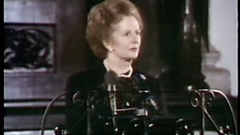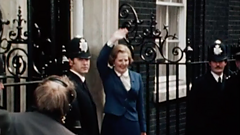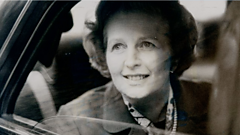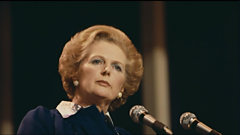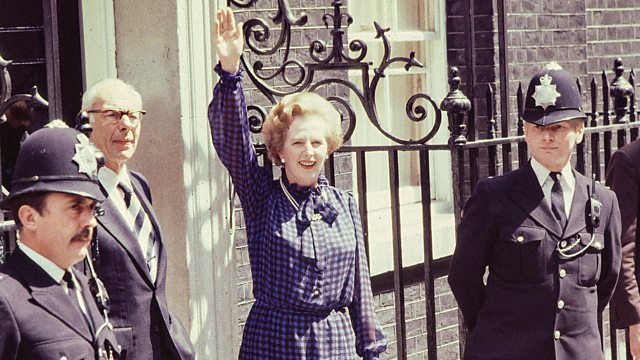
Power
Mrs Thatcher struggles to cling to power as the economy collapses, riots break out and she is subverted by members of her own cabinet.
Mrs Thatcher's victory in the 1979 general election propels her into power as Britain's first female prime minister. On the steps of Downing Street she promises "hope" and "harmony" but her first two years are characterised by disruption and division.
Her first cabinet is split between a small group who are aligned with her plans for radical change, but the majority are experienced ministers from the traditional power base of the party who prefer a more consensual style of politics. From day one there is friction between Mrs Thatcher and some of her senior colleagues.
She also confronts an economy that is in deep trouble. All the indicators are pointing in the wrong direction with inflation rising, unemployment spiralling and public spending growing. The government have to raise taxes and interest rates but these tend to make things worse. A year after taking power Mrs Thatcher sees the economy plunge into the deepest recession since the great depression.
As the heavy industries that are the backbone of many British communities collapse, unemployment starts to climb. Mrs Thatcher refuses to reinflate the economy and invest millions in failing industries. She gains a public reputation as uncaring and harsh that will become part of her image and her legacy. Within her own party there is deep dispute about economic policy and she is forced into a famous conference speech asserting her determination, stating “You turn if you want to. The lady’s not for turning”.
Within the cabinet, Mrs Thatcher’s style creates tensions. Many of her colleagues find her demanding and argumentative and she finds many of them indecisive and insufficiently committed to her political philosophy. In stark contrast her close staff however find her an unusually sympathetic and attentive boss.
1981 is a year of unrest and change. Serious riots scar British inner cities with many pointing the finger at Mrs Thatcher and her policies as the cause of the trouble. In government Mrs Thatcher’s doubters are emboldened and seek to force her into a change of direction. But the prime minister refuses to relent and moves against her critics removing them from the cabinet and bringing in allies who will back her as she leads Britain into the turbulence of the 1980s.
Featuring interviews with the surviving members of her first cabinet, John Nott, Michael Heseltine, Norman Fowler and David Howell, her private secretaries Tim Lankester, John Cole and Nick Sanders, her personal assistant Cynthia Crawford, her protection officer Barry Strevens, Downing Street secretary Janice Richards and press secretary Bernard Ingham. We also hear from senior Conservatives who were close to her, including Michael Dobbs, Lord Gowrie, Jonathan Aitken, Norman Tebbit, Kenneth Baker and Nigel Lawson, as well as political opponent David Owen.
Last on
More episodes
Previous
Next
Clips
-
![]()
Margaret Thatcher Confronted By Protesters
Duration: 01:40
-
![]()
Margaret Thatcher's First Election Victory
Duration: 02:37
-
![]()
The Caring Side of Margaret Thatcher
Duration: 01:40
-
![]()
Margaret Thatcher Takes Control
Duration: 01:59
Music Played
-
![]()
Magazine
The Light Pours Out Of Me
Credit
| Role | Contributor |
|---|---|
| Executive Producer | Steve Condie |
Broadcasts
- Mon 27 May 2019 21:00����ý Two except Northern Ireland & Northern Ireland HD
- Tue 28 May 2019 23:15����ý Two Northern Ireland & Northern Ireland HD only
- Wed 29 May 2019 23:15����ý Two HD & England only
- Fri 14 Jun 2019 00:50
- Mon 22 Jun 2020 19:00
- Tue 24 Nov 2020 21:00
- Wed 25 Nov 2020 02:35
- Wed 15 Jun 2022 21:00
- Thu 16 Jun 2022 02:55
